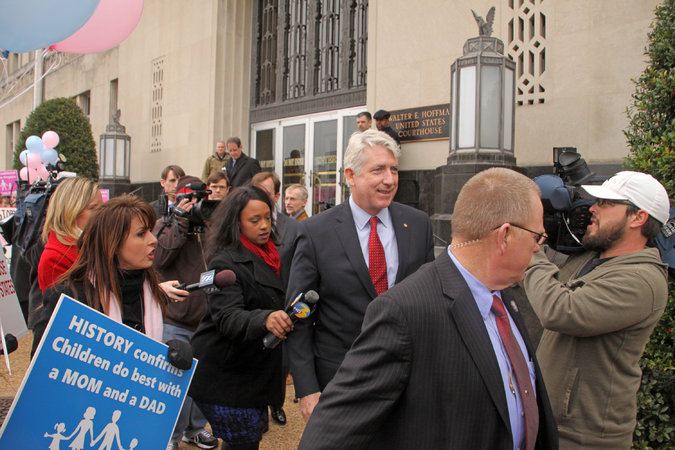
In a 2-1 decision, a panel of the Fourth Circuit has declared Virginia's ban on same-sex marriage unconstitutional.
The Fourth Circuit majority held that the ban violated equal protection and due process guarantees in prohibiting gay couples from marrying.
"We...have no reason to suspect that the Supreme Court would accord the choice to marry someone of the same sex any less respect than the choice to marry an opposite-sex individual who is of different race, owes child support, or is imprisoned. Accordingly, we decline the Proponents' invitation to characterize the right at issue in this case as the right to same-sex marriage rather than simply the right to marry," the panel stated.
The court also boldly used the word "segregation" when describing the exclusion of homosexual couples from marriage: "Denying same-sex couples this choice prohibits them from participating fully in our society, which is precisely the type of segregation that the Fourteenth Amendment cannot countenance," the court stated.
The lawsuit was filed by two Norfolk men who were denied a marriage license and two Chesterfield County women whose marriage in California is not recognized by Virginia.
According to the Associated Press, the Virginia gay marriage case is one of several that could go to the U.S. Supreme Court, and unless a petition for re-hearing is granted, same-sex couples will be permitted to get married in Virginia as early as Aug. 18.
Liberty Counsel, a legal organization that supports the traditional family, responded to Monday's decision.
"Marriage between one man and woman, raising children in that stable environment, gives something back to society. It truly is a bedrock foundation, and when you take that apart you are going to see consequences in society," Rena Lindevaldsen of Liberty Counsel said.
Lindevaldsen added that the court's decision undermines the founding father's intent to have a moral basis for laws in the United States.
"In today's opinion the 4th Circuit rules that morals should no longer be the basis for our laws. When you stop and think about that for just a second, think of the laws that impacts. Murder, rape, stealing, and all of the laws that we rely on to have an ordered civilization are arguably thrown out because of this logic," Lindevaldsen said. "We know that court doesn't mean that, but the question is how far is the court going to take that, and where will this court and the Supreme Court stop, before we no longer even have morals as the foundation of our laws."
Monday's ruling applies to the entire 4th Circuit, including Virginia, West Virginia, North Carolina, South Carolina, and Maryland.














